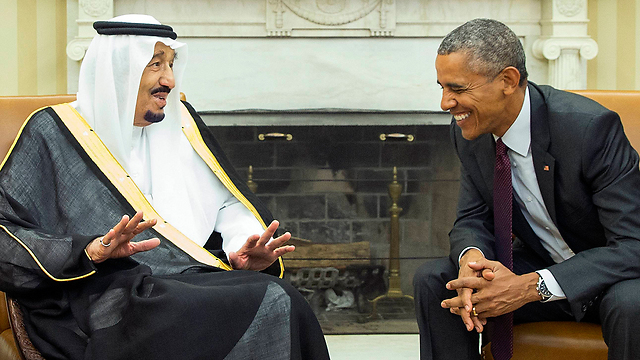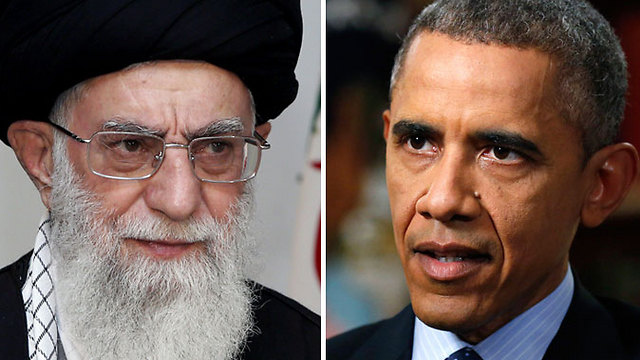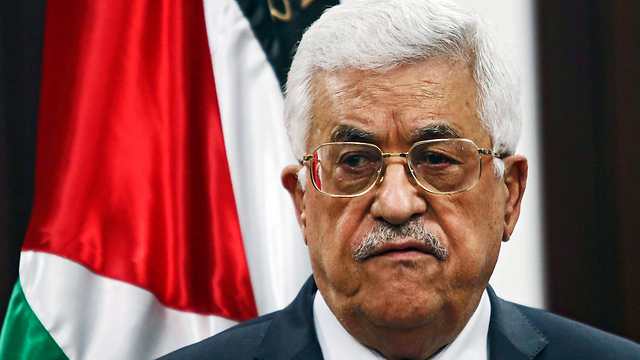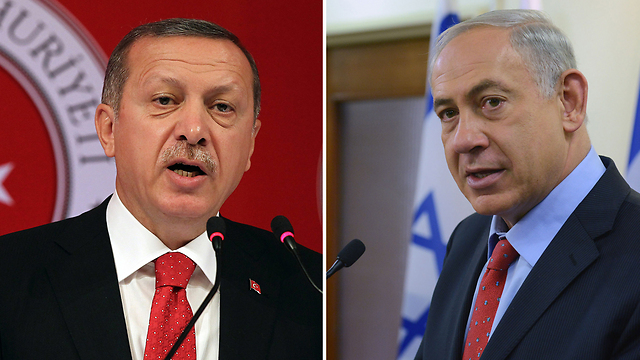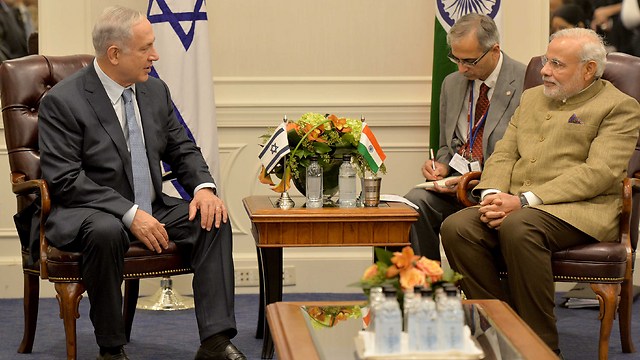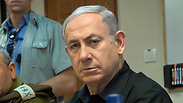
Netanyahu can only seek solace in the fact that US public opinion, and a majority of Congress are against the deal – which is what allows him to hope that the new US president will cancel the deal upon entering office in January, 2017.
The passing diplomatic year has mainly surrounded the Iran issue and Israel's attempts to scuttle the deal. Israel has been left largely isolated. The Gulf states including Saudi Arabia – which views Iran as a bitter enemy- have openly stated their support for the deal. The king of Saudi Arabia is currently engaged in talks with the Americans dealing with a proposed compensation package, while Netanyahu stands steadfast in his refusal to discuss a compensation package.
Netanyahu recently told his British counterpart Cameron that he his ready to renew the now defunct negotiations with the Palestinians. In a meeting with British parliamentarians, Netanyahu said that he is ready to hold talks with Mahmoud Abbas in Sicily, the fiords, and even Ramallah, "Although it is a nightmare for my security team."
Netanyahu's refusal to discuss a compensation package in an effort to prevent giving the deal any legitimacy, while the rest of the world rushes to do business with Iran – has left Israel far behind the pack.
The new year will no longer surround the Iran issue. Officials in Israel believe that the Iranians will uphold their part of the deal in order to speed up the removal of all the sanctions, and reap the resulting financial benefits. Additionally, experts on the matter admit that nuclear weapons aren’t really at the top of the Ayatollah's to-do list. Their goal is to maintain the nuclear option at this point.
Israel will face a nearly impossible battle to keep the issue on the agenda while the Iranians are seen as maintaining their end of the bargain. Simply stated, Netanyahu can no longer take the podium at the UN General Assembly with a doodle representing the Iranian nuclear program, and even if he chooses a new gimmick – it's doubtful that he will be taken seriously.
Israel will face a serious and complicated challenge as a result of the deal: On the one side it will have to maintain its high quality intelligence activities against Iran, in order to confirm Iranian compliance with the deal; and on the other hand, Israel will have to prepare for a scenario in which the Iranians fault on the deal and race towards the bomb.
Concurrently Israel will have to closely follow the Islamic Republic's attempts to arm the various terror organizations in the region, and their increasing attempts to gain hold over whole areas of the Middle East.
Obama prefers the Iranians
This is where the most important strategic necessity of the new year comes to play, the need to repair ties with the US. The battle over the Iran deal has left the Israeli side licking its wounds. In light of statements made by Netanyahu and Obama which seek to affirm the unbreakable ties between the US and Israel – many Israeli diplomatic and security officials have warned that the relationship has suffered serious damage. The main victim being the previously held intimacy between the two allies. Behind the scenes, Israeli officials have said that Obama made a strategic decision to favor the Iranians over Israel, which has trickled down to the lowest levels. It’s the spirit of the commander.
Israel also managed to damage its ties with the American Jewish community by forcing them to pick sides, with many choosing Obama over Israel. The result was an open fracture within the Jewish community. Only two of 10 Jewish senators voted against the deal, which sums up the entire story pretty well, and leaves the bitter taste of failure in the mouths of the deal's opponents. Netanyahu simply failed to rally the whole Jewish community behind him, leading Obama to victory on Netanyahu's home turf.
The new year should be one of repair. Netanyahu must work towards improving his personal relationship with Obama. They have another year and a half to work together. Netanyahu needs to take advantage of Obama's declared intent to not punish Israel over its opposition to the deal, and work towards improving the compensation package that the US will give Israel.
Mending the ties will most likely be the topic of the hour during the November meeting Netanyahu is expected to hold with Obama in Washington.
Netanyahu has to coordinate with Obama on two main issues: Iran and the Palestinians. What will happen if the Iranians don’t keep up their end of the bargain and race towards a bomb, under what conditions will the US snap back sanctions, or return to the military option, and how will they deal with the Palestinian issue – which is likely to provide the two with quite the headache in the upcoming year.
Abbas's will: Palestine's year
It is already apparent that the Palestinians will do everything in their power in order to refocus the international spotlight on themselves. If it was up to Mahmoud Abbas- he wants the next year to be the year of Palestine, like the Iran year that passed.
The Palestinians are in a tough spot: the refugee crises, the collapse of the Arab states, and hundreds of thousands of Syrian dead are the greatest catastrophe to ever befall the Palestinian national movement since the day of its inception. These issues place the Palestinian cause at a relatively low slot on the global list of priorities.
The Palestinians don’t really grab the world's attention anymore, to the deep frustration of the Palestinian leadership. This frustration is compounded by the internal power struggles taking place within the PLO leadership, and the attempts to challenge Abbas's leadership. The Reis is looking for a move which will shake the world and bring the Palestinian issue back to center stage, while strengthening his position as leader of the Palestinians. The move will most likely be revealed during his speech at the UN General Assembly on the September 29. Israeli officials are struggling to predict his plan, and worry that he himself has not made a decision, while people are trying to influence him.
The Palestinian media have hinted at certain actions, but mostly partake in psychological warfare. Among the options are: Cancelling the Oslo accords, dismantling the PA – leaving Israel responsible for the entire Palestinian population as an occupying force, declaring Palestine a "State under occupation" (international law terminology), which allows them to seek protection from the international community, while turning to the UNSC in an attempt to grant Palestine full state status.
How Israel would react to each of the moves is also unclear. The more severe the Israeli reaction will be – the bigger the service it does to the Palestinian cause. Israeli officials are already warning that if Abbas "breaks the rules" – Israel will review the possibility of exiling him, or blockade him- similar to what was done with Yasser Arafat. Israel will do itself a great service if it keeps its wits about it, and ignores the Palestinian provocations. Even if they declare the cancelation of the Oslo accords, they won't stop the security and economic cooperation with Israel, especially due to the fact that it serves them as much as it does Israel.
In the case of a drastic one sided move by the Palestinians – The right wing in Israel will enact great pressure on Netanyahu in an attempt to force a drastic reaction like annexing the West Bank, annexing area C, or massive settlement building. Netanyahu will have to act responsible and lead with wisdom in order to neutralize a ticking bomb of this type, and that’s without mentioning the possibility that a third intifada is brewing under the surface. An Israeli office has said – They may try to start a fire, of which they will quickly lose control – a self fulfilling prophecy.
Most experts in Israel estimate that Obama has no interest in getting into yet another yelling match with Israel. American officials have said, "We don't delude ourselves into thinking we can reach a long term agreement in the time left, but on the other hand we can't ignore the Israeli- Palestinian conflict." There are those who believe that Obama is still intent on making progress on the Palestinian issue for his legacy. If this is true- we should watch out for another clash with Netanyahu, who stated that he will never allow for the creation of a Palestinian state during his term on the night of the most recent elections.
European Sanctions- Settlement product labeling
It's possible that the Americans will choose to be passive on the matter, and allow other players to fill their place – one of those players is the EU. The Europeans are dedicated to advancing settlement product labeling legislation. In the coming weeks, the EU is expected to publish a set of guidelines, which will force the 28 member states to label products originating beyond the Green Line. Product labeling is a form of Europe sanctioning Israel's settlement expansion policy, although they present the move as a bureaucratic measure and not some sort of revenge.
If Obama decides not to use the US veto in the UN Security Council against important anti-Israel measures which may line up with US national policy – it will be a serious blow to Israel. The American veto is a strategic asset which must be protected. If Obama does decide to push for a peace deal between Israel and the Palestinians – it is to be assumed that Netanyahu will fight the deal in an attempt to hold out until the presidential elections. In that case we would see Netanyahu repeating his 2012 mistake, in choosing sides- which has cost him dearly ever since.
Stagnation will make fighting boycotts more difficult
On top of all the issues mentioned, there is the threat posed by BDS, which seriously worries Israel. Until now the BDS has not had many serious success, but it hasn’t quite either. The longer the stagnation of the peace process continues – the more difficult it will be fore Israel to fight boycott movements. Israel has a clear interest in returning Abbas to the negotiating table. It will solve a lot of problems.
Israel is missing a chance to capitalize on the unique threats currently posed to it by the Iran deal and ISIS. There is a real chance to create partnerships with the Arab states in the regions. Israel has the strongest army and these states may need us at some points, this is especially true for Jordan.
Turkey remains a question, India: full speed ahead
This coming year, Israel has a strong interest in ending its diplomatic crises with Turkey, while restoring to full relations. Turkey represents a strong counter weight to Iran. The distance between Israel and Turkey on settling the Marmara issue is not great, but the real question is whether Erdogan will want to be seen as reproaching with Israel while he fights decreasing support figures before elections. Past experience has taught that Erdogan always incites against Israel during elections, which will probably scuttle and chance at resolving the crises. Its also possible that after renewing its campaign against the Kurds, Turkey will seek to minimize or end the crises with Israel.
This past year marked the blossoming romance between Israel and India, which was led by Prime Minister Narendra Modi, who decided to break with India's historic approach to Israel. India changed its voting patterns in international organizations on matters related to Israel and has become much more balanced. The Indian Prime Minister is set to arrive in Israel for a historic visit sometime this year – the visit will be the first of its kind by a sitting Indian Prime Minister since the establishment of relations in 1992.
Defense Minister Moshe Ya'alon visited India in February – a visit which was also termed historic, as it was the first by an Israeli Defense Minister. Israel is the second largest weapons exporter to India - which is the largest importer of weapons in the world. The commander of the Israeli Navy Maj. Gen. Ram Rothberg visited India recently, and was greeted with a very warm and public welcome. The Indians are not concerned with the Arab state's reactions anymore, and they view strengthening ties with Israel as a strategic necessity. The Indian romance with Israel is set to continue and even grow in the new year.
Israel has also built close ties with China and Japan, and it aims to expand them on all levels. Netanyahu has seemingly sought to strengthen ties with Asia as a counter weight against deteriorating ties with Europe.
Netanyahu has also set his sights on Latin America, strengthening ties with Brazil, Mexico and more. Africa has also become an important diplomatic target for Israel, due to the changes in African countries' voting patterns in international institutions among other things.
Israel will continue to maintain very close ties with Greece (the ties have continued to tighten even though Greece is controlled by a left wing government which is historically critical of Israel), and Cyprus – mainly due to security interests, but also due to the discovery of natural gas fields of the coast of Israel. There is a strong possibility of Israel building a pipeline to Cyprus and Greece, from which the gas will be sold to Europe.
Challenges ahead:
Israel still faces challenges in its neighborhood. Hezbollah is currently operating freely in Lebanon and Syria, while it builds its massive arsenal, and while the Syrian Army has faded into the darkness – no longer posing a threat to Israel for the first time in decades.Jordan is encircled by ISIS to the east and Al Qaeda to the north, leading Israel to build a new border fence with its eastern neighbor, but also leading it to strengthen ties with the Hashemite kingdom – with recent reports claiming Israel gifted Jordan with a squadron of Cobra attack helicopters.
It's important that Israel attempt to develop strategic ties with Putin's Russia, which has become a key regional player after the US disengagement from the region.
In the US- Israel needs to develop a relationship with the minority communities which will shape US policy in the future, including the Hispanic, African-American, Asian, and LGBT communities. Israel must also act to mend the tear it created within the American Jewish community.
In conclusion: Israel is entering a new year with quite a few risks, but also quite a few opportunities. The wisdom in diplomacy is to generate the opportunities in order to mitigate the risks.















